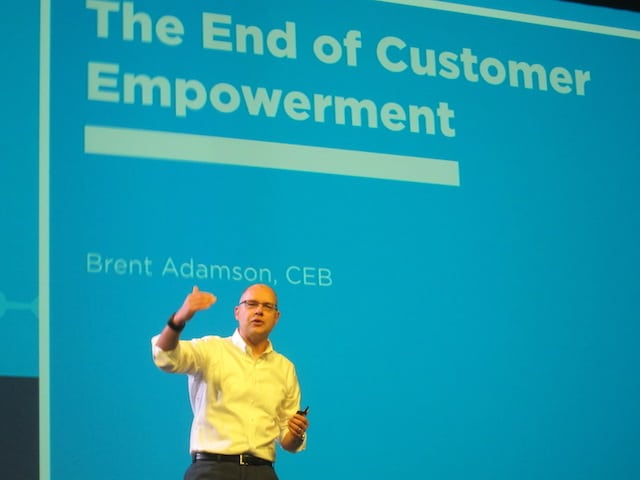Yesterday I attended the first day of CEB’s annual Sales & Marketing Summit. It’s a must-attend for all B2B sales and marketing leaders, offering the most current view into the buyer’s world and the best practices that come from following hard data. The opening keynote by CEB’s Brent Adamson blew my mind as he revealed a plot twist in the B2B buyer’s journey.
The customer’s age of empowerment was short lived. The tipping point has been passed, where today, the customer wants less information and fewer choices. Like they were in 1990 … simple prescriptions by suppliers will win the day. To quote Yogi Berra: “It’s like Deja Vu all over again!”
Making matters worse, the rise in decision-makers (The 5.4 Problem) and the diversity of perspectives and agendas make the buying process “landmindish” — cause Brent to wonder how companies buy anything or for that matter, get anything done! Between the landmines and the overwhelming amount of info and options, he declared that the seller’s #1 competition is now … The Status Quo.
Back to empowerment: Brent asks, “When you visit the grocery store today and there are 50 kinds of mustard on the shelf, do you feel empowered?” This is a good point as we marvel as shopping sites like Amazon, Expedia for travel, TrueCar for auto purchase, etc. While they put is in charge at some point, being in charge loses its luster. The CEB data confirms that the modern B2B buyer is as overwhelmed as today’s consumer…but the implications are far worse for suppliers.
When the buying experience is overwhelmingly complex, the buyer usually regrets their decision later. Think about the last car you bought: If you were swimming in information, with endless cars to choose from and myriad options to pile on … do you still feel like you made the right decision today? According to CEB research, the B2B buyer is more likely to regret their decision when the purchase journey was complex.
At this point, Brent raises the stakes for suppliers: “It’s no longer about whether you win or lose, but now, it’s about how the buyer feels about it later.” To support this (very Lovecat way) of thinking, he offered this stunning chart, which proves that regrettable purchases are BAD for sellers.
Pay particular decision to the bars on the right: When the buyer regrets their purchase decision they actively advocate against the supplier! This isn’t a Net Promoter Score dip, Brent points out, they are telling other people inside their company or out in the market not to buy from you!
The conclusion of Brent’s keynote outlines a new selling approach: Prescription to drive ease-in-buying. “Put all your sales and marketing strategy through the Easeometer,” he advises. In other words, to capture the essence of Bill Jensen’s classic book Simplicity: Reduce the stuff, the steps and make the process simple. Brent defines prescription as “a credible and influential set of do this/don’t do that recommendations, provided to customers across the purchase process, deliberately intended to ease the customer’s movement toward purchase.” This includes how the buyer should prioritize the problem, who they should involve in the purchase process and how they should arrive at supplier decisions. CEB research indicates that the Prescriptive Process will dramatically outperform the Responsive Process in terms of sales cycle & overall satisfaction.
He closed the keynote with a salient example of the Rise of Prescription: The comeback of travel agencies. Over the last few years, travel consultants have picked up a lot of harried consumers or business travelers who were overwhelmed with information and options about their upcoming trip. In a world of always-on smartphone powered buyers … these travelers just wanted to “call someone and have them figure out the best way to book the trip.” As I’ve learned in my research for my next book (Dealstorming), B2C trends like this are the Canary In the Coal Mine for B2B sellers. Which means that you might want to have a meeting today between sales and marketing and figure out how you can make the leap from responsive to prescriptive approaches.
For more on the psychological impacts of information overload, check out the 2004 research I conducted with Heartmath Institute, predicting the rise of New Economy Depression Syndrome.


